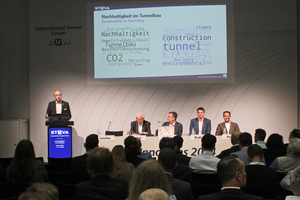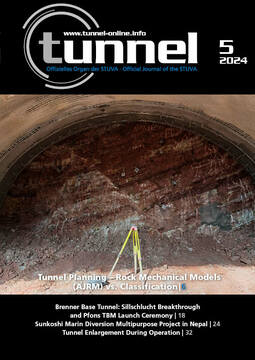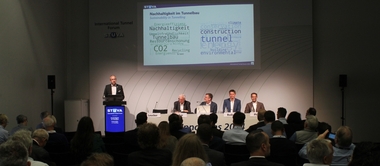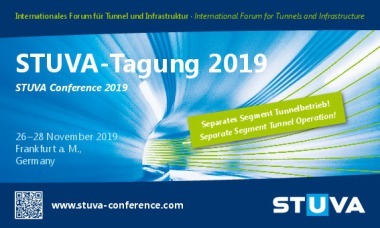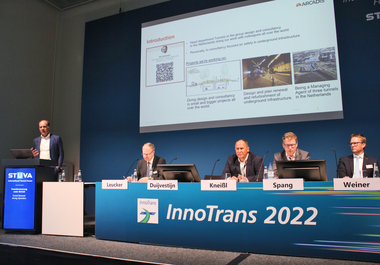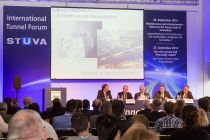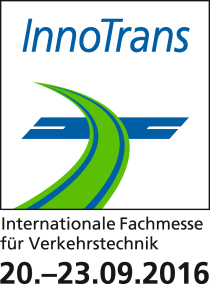International Tunnel Forum: Sustainability and
Challenges in Tunnelling
The 14th InnoTrans took place at the Berlin ExpoCenter City exhibition grounds from 24 to 27 September 2024. The STUVA‘s International Tunnel Forum was once again one of the highlights of the 2024 event programme.
In addition to the multi-day trade fair programme in the exhibition halls, InnoTrans offers a platform for the exchange of knowledge and opinions at an international level with panel discussions and expert panels on mobility topics relevant to the future. A total of five dialogue forums (Rail Leaders‘ Summit, International Design Forum, International Tunnel Forum, Public Transport Forum, DB Innovation Forum, International Bus Forum) were offered as part of this year‘s InnoTrans Convention.
The International Tunnel Forum has been organised by STUVA e. V. since 2008 and discusses current issues relating to mobility and tunnelling in a compact form with an expert audience every two years at InnoTrans. Once again this year, the two high-quality lecture rounds were moderated by STUVA Managing Director Prof. Dr.-Ing. Roland Leucker.
Sustainability in Tunnelling
On 25 September, the packed lecture room in the CityCube focused on the key future topic of “Sustainability in tunnelling”. The following topics were on the programme:
Underground Construction in Accordance with the
UN Sustainability Goals
Dipl.-Ing. ETH Heinz Ehrbar, Representative of DB InfraGO AG in the German Tunnelling Committee DAUB, Cologne
Low Carbon Precast Segment Lining Using Steel Fibre Reinforced Concrete
Dipl.-Ing. Benoit de Rivaz, Global Technical Manager, NV Bekaert SA, Zwevegem, Belgium
Tunnelling as a Source Of Raw Materials –
Utilisation of Excavated Tunnel Material
Prof. Dr.-Ing. Christoph Budach, Department of Geotechnics and Tunnelling, Cologne University of Applied Sciences, Cologne
Metro U5 in Hamburg – A Showcase Project for
Climate-Friendly Transport Infrastructure Construction
Dipl.-Ing. Frank Plöger, Head of Sustainability Department, HOCHBAHN U5 Projekt GmbH, Hamburg
Heinz Ehrbar gave an overview of the contributions that underground construction can make to achieving the UN sustainability goals. He focussed on sustainability in the ecological sense. On the one hand, this includes the various utilisations of tunnels. For example, as underground infrastructure for climate-friendly transport, which at the same time does not cut up living spaces on the surface and provides relief and revitalisation of a liveable urban environment, particularly in cities. Or water-bearing tunnels – for drinking water supply, wastewater disposal (e.g. the Emscher conversion) and also for climate-neutral electricity production, even with high energy efficiency.
He also emphasised the need for ecological sustainability as a cornerstone of planning and construction processes. The keyword here being CO2 reduction, in this case using the example of the circular economy, in particular the recycling of tunnel excavation material. A DAUB recommendation on this topic was published in September 2024.
Benoit de Rivaz presented another example of the possibility of reducing CO2 emissions in tunnel construction: steel fibre-reinforced segments, which enable a reduction in both concrete and steel consumption. No small feat, because according to de Rivaz, 60 to 80 per cent of the CO2 footprint in tunnel construction is attributable to the lining. (We also recommend reading the technical article in tunnel 4/24 on the use of these segments as part of the Grand Paris Express project).
Christoph Budach gave a deeper insight into the topic of the circular economy: tunnelling as a source of raw materials – through the recycling of excavated material. Budach demonstrated that these efforts are also worthwhile with a figure from the STUVA tunnelling statistics: more than 8 million tonnes of excavated material were produced last year during tunnelling in Germany alone, “huge quantities of excavated material. The aim must be to reuse this material as far as possible and in as high a quality as possible.” Using project examples, he showed what is already being done in this area.
Finally, Frank Plöger brought along a detailed project example: the U5 underground railway line in Hamburg. Efficient use of concrete, utilisation of excavated material, climate-friendly construction processes – Plöger urged: “Keep an eye on ecological sustainability!” And specifically on the subject of CO2 emissions, he emphasised that these must be a key evaluation criterion in the project right from the start: “This must be incorporated into the tendering process.”
Challenges in Tunnelling
One day later, on 26 September, another panel of experts dealt with the topic of “Current challenges in tunnelling” with four presentations. The presentations highlighted the planning and construction of current large and sometimes spectacular tunnelling projects that not only make use of the available technology and new materials, but also go beyond this and continue to push the boundaries of what is feasible in modern tunnelling a little further – or even open up completely new dimensions of the possibilities of underground construction:
Erzgebirgstunnel – A Cross-Border Project of the
Century with the Longest Railway Tunnel in Germany
Dipl.-Ing. Kay Müller, Overall Project Manager for the New Dresden–Prague Line, DB InfraGO AG, Leipzig
Frankfurt am Main Mainline Railway Tunnel –
Construction of an Inner-City Tunnel with Underground Station
Dipl.-Ing. Rainer Haschke, Head of Construction Technology Fernbahntunnel Frankfurt am Main, DB InfraGO AG, Frankfurt
Fehmarnbelt Fixed Link – The Longest Immersed Tunnel in the World
Dipl.-Ing. Gerhard Cordes, Contract Director, Femern A/S, Kopenhagen, Denmark
New Safety Concepts for Underground Track-Bound Junctions
Dr. sc. nat. Andreas Busslinger, Member of Management Board, HBI Haerter AG, Bern, Switzerland
Marvin Klostermeier

